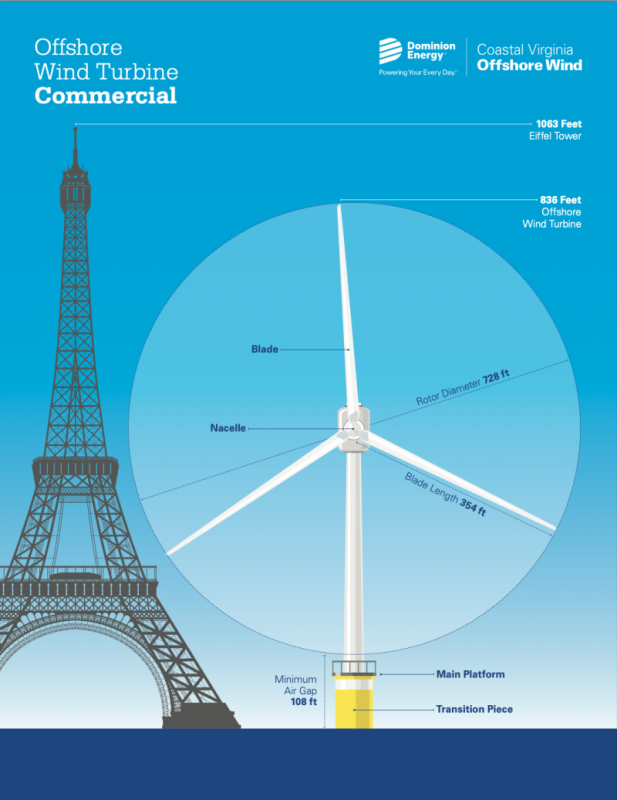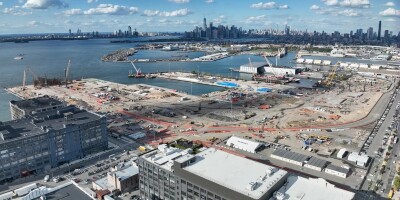The Biden administration announced its approval Tuesday of the Coastal Virginia Offshore Wind project, the largest to date in U.S. waters with a planned maximum rating of 2,600 megawatts.
Eight steel monopile foundations arrived in Portsmouth, Va., Oct. 19, the first components for the planned 176 turbines in an $9.8 billion array starting 23.5 miles east of Virginia Beach, Va. It’s the fifth utility-scale wind project approved through the Bureau of Ocean Energy Management, following the Vineyard Wind 1, South Fork Wind and Revolution Wind projects off southern New England, and Ocean Wind 1 off New Jersey. Together the projects will collectively generate more than 5 gigawatts of maximum potential.
But the CVOW approval also arrives amid broader turmoil in the renewable energy industry, beset by rapidly escalating costs and financial losses for developers and turbine manufacturers. Most recently four developers that sought bigger subsidies for projects off New York were rejected by New York State energy regulators, leaving the future of their plans in doubt.
Biden administration officials and CVOW developer Dominion Energy portrayed the approval Tuesday as a milestone. The project “is expected to provide about 900 jobs each year during the construction phase and support an estimated 1,100 annual jobs during the operations phase, generating vital economic development for Virginia’s Hampton Roads area and supporting investments in the Virginia coastal region as a hub for offshore wind development and support,” according to a prepared statement from BOEM.
“The Interior Department is committed to the Biden-Harris administration’s all-of-government approach to the clean energy future, which helps respond to the climate crisis, lower energy costs, and create good-paying union jobs across the manufacturing, shipbuilding and construction sectors," said Secretary of the Interior Deb Haaland.
Offshore wind advocates, including governors of six East Coast states, have urged the Biden administration to make more subsidy available for wind power, in the form of tax credits under the Inflation Reduction Act. The American Clean Power Association reiterated that call in a statement issued Tuesday after the CVOW decision.
“We appreciate the White House's reiterated commitment to use every tool available to bring offshore wind benefits to American workers and communities. Only robust Treasury guidance on the IRA tax credits will fully deploy these benefits,” according to the ACP.
The “record of decision” includes alternatives to the project layout that “will reduce impacts to navigation and a known fish haven, allow for ocean co-use, and meet the energy needs of Virginia,” according to BOEM. Other measures aim to avoid, minimize and mitigate impacts during construction and operation.
“Among those measures, Dominion Energy has committed to establishing fishery mitigation funds to compensate recreational and commercial fisheries for any losses directly arising from the project. Dominion Energy has also committed to measures, including vessel speed restrictions and construction clearance zones, to reduce the potential for impacts to protected species, such as marine mammals, sea turtles and Atlantic sturgeon,” BOEM said in its statement.
The decision follows a favorable environmental impact statement from BOEM last month, and the arrival of the monopile foundations built by EEW Spc in Germany. The foundations will be staged at the Portsmouth Marine Terminal until construction in spring 2024.
Dominion and Virginia maritime operators are betting that the offshore wind business will be transformative for the Hampton Roads region, already a center for trade, shipbuilding and Navy operations.
“More than 750 Virginia-based workers – nearly 530 in the Hampton Roads region – have been engaged on the CVOW project or with other businesses supporting CVOW, including redevelopment work at the Portsmouth Marine Terminal, construction of the offshore wind Monitoring and Coordination Center, maritime provisioning, ship repairs, heavy lift and rigging, cyber security, food service and hospitality. More than 1,000 local jobs will be needed to support ongoing operations and maintenance of this facility after the project is commercial,” according to Dominion officials.






